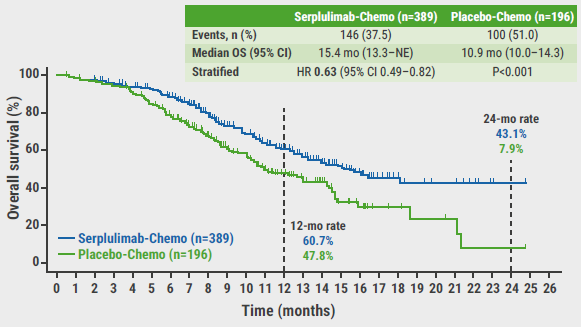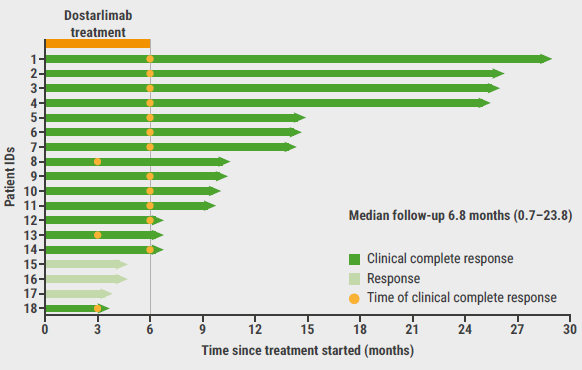https://doi.org/10.55788/fa0e720b
“There is still a huge unmet medical need for patients with SCLC,” stated Prof. Ying Cheng (Jilin Cancer Hospital, China). In the pivotal ASTRUM-010 study, the novel PD-1 inhibitor serplulimab demonstrated encouraging anti-tumour activity and a manageable safety profile in patients with microsatellite instability-high or mismatch repair-deficient (MSI-H/dMMR) solid tumours [1]. Prof. Cheng presented the primary results of the phase 3 ASTRUM-005 trial (NCT04063163; n=585), which randomised patients with previously untreated ES-SCLC 2:1 to serplulimab plus chemotherapy or placebo plus chemotherapy [2]. The primary endpoint was overall survival (OS).
After a median follow-up of 12.3 months, patients on serplulimab had a significant OS benefit over patients on placebo (median OS 15.4 vs 10.9 months; HR 0.63; P<0.001; see Figure). This result was consistent across subgroups, including patients with various PD-L1 expression levels. Also, the median progression-free survival (5.7 vs 4.3 months; HR 0.48), overall response rates (80.2% vs 70.4%), and median duration of response (5.6 vs 3.2 months; HR 0.48) favoured serplulimab over placebo.
Figure: Overall survival of serplulimab plus chemotherapy versus placebo plus chemotherapy [2]

OS, overall survival; mo, month; NE, not estimable.
The safety profiles of the 2 treatment regimens were mostly comparable. Serious adverse events (AEs) were reported in 35% of the patients in both arms and treatment discontinuations were observed in 4.9% and 4.1% of the patients in the experimental and placebo arm, respectively. Immune-related AEs were more prevalent in the serplulimab group (37.0% vs 18.4%), with hypothyroidism (11.6%), hyperthyroidism (9.0%), and rash (3.1%) being the most commonly identified immune-related AEs in the experimental group.
This survival advantage of nearly 5 months is the highest of any Checkpoint inhibitor in this setting up to now. If confirmed, serplulimab could be the first PD-1 inhibitor in this setting and could outperform previously reported PD-L1 inhibitors.
- Qin SK, et al. J Clin Oncol. 2021;39(15_suppl):2566–2566.
- Cheng Y, et al. Serplulimab, a novel anti-PD-1 antibody, plus chemotherapy versus chemotherapy alone as first-line treatment for extensive-stage small-cell lung cancer: An international randomized phase 3 study. Abstract 8505, ASCO 2022 Annual Meeting, 3‒7 June, Chicago, IL, USA.
Copyright ©2022 Medicom Medical Publishers
Posted on
Previous Article
« Adagrasib safe and clinically active in non-small cell lung cancer Next Article
Additional tiragolumab does not help patients with untreated small cell lung cancer »
« Adagrasib safe and clinically active in non-small cell lung cancer Next Article
Additional tiragolumab does not help patients with untreated small cell lung cancer »
Table of Contents: ASCO 2022
Featured articles
Breast Cancer
Sacituzumab govitecan meets primary endpoint
Shaky OS results of palbociclib in ER-positive/HER2-negative breast cancer
Practice-changing results of T-DXd in HER2-low breast cancer
SET2,3 to inform on chemotherapy decisions in ER-positive breast cancer
Metastasis-directed therapy fails in oligometastatic breast cancer
Analysis by residual cancer burden further clarifies effect of pembrolizumab
Contribution of metastatic therapies on mortality reduction in breast cancer
Radiotherapy may be omitted in breast cancer patients
Promising data for ribociclib after progression on ET plus CDK4/6 inhibitors in HR-positive/HER2-negative metastatic breast cancer
7-gene biosignature: Benefits of endocrine therapy and radiotherapy in breast cancer risk groups
Lung Cancer
Additional tiragolumab does not help patients with untreated small cell lung cancer
Success for serplulimab plus chemotherapy in small cell lung cancer
Adagrasib safe and clinically active in non-small cell lung cancer
Long-term benefits of combined immunotherapy over chemotherapy in non-small cell lung cancer
Effect of KRAS mutations and PD-L1 expression on therapy response in non-small cell lung cancer
Melanoma
First results on distant metastasis-free survival in stage II melanoma
Higher response rates for concurrent triple therapy versus sequential therapy in melanoma
Genitourinary Cancers
Exploratory treatment options fail in ccRCC
Adjuvant everolimus did not benefit high-risk renal cell carcinoma
Cabozantinib fails as first-line maintenance therapy in urothelial cancer
177Lu-PSMA-617 is a valid treatment option for PSMA-positive mCRPC
Enzalutamide performs well in metastatic hormone-sensitive prostate cancer
Haematologic Malignancies
Autologous stem cell transplantation plus RVd improves PFS in multiple myeloma
Novel first-line treatment option for mantle cell lymphoma
Promising results for novel CAR-T therapy in relapsed/refractory multiple myeloma
Gastrointestinal Cancers
Panitumumab beats bevacizumab in RAS wildtype left-sided metastatic colorectal cancer
Spectacular results for dostarlimab in mismatch repair deficient rectal cancer
Triplet chemotherapy beats doublet chemotherapy in colorectal cancer liver metastases
To resect or not to resect primary tumours in stage IV colon cancer?
Novel treatment option for KRAS wildtype pancreatic cancer
Gynaecological Cancers
Primary results of rucaparib in ovarian cancer
Trabectedin not superior to chemotherapy in recurrent epithelial ovarian cancer
Encouraging results of relacorilant in ovarian cancer
Miscellaneous Topics
Bacterial decolonisation effective against radiation dermatitis
New standard-of-care for cisplatin-ineligible locally advanced head and neck squamous cell carcinoma
Ifosfamide is likely to be the go-to therapy in recurrent Ewing sarcoma
Dabrafenib plus trametinib candidates for standard-of-care in BRAF V600-mutated paediatric low-grade glioma
Related Articles
August 5, 2022
Primary results of rucaparib in ovarian cancer

© 2024 Medicom Medical Publishers. All rights reserved. Terms and Conditions | Privacy Policy

